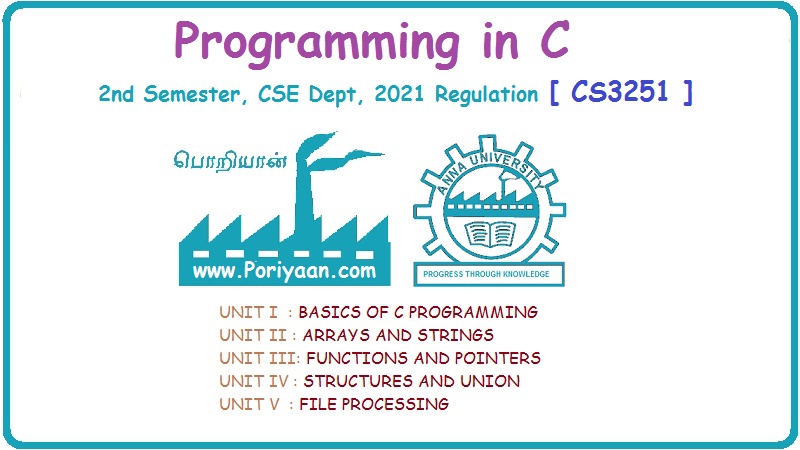Programming in C: Unit I (b): Introduction to C
Files Used in a C Program
The source code file contains the source code of the program. The file extension of any C source code file is ‘.c'.
FILES
USED IN A C PROGRAM
Every
C program has four kinds of files associated with it (Figure 2.3). These
include:

Source Code Files
The
source code file contains the source code of the program. The file extension of
any C source code file is ‘.c'. This
file contains C source code that defines the main function and maybe other
functions. The main() function is the
starting point of execution when you successfully compile and run the program.
A C program in general may include even other source code files (with the file
extension. c).
Header Files
When
working with large projects, it is often desirable to separate out certain
subroutines from the main() function
of the program. There also may be a case that the same subroutine has to be
used in different programs. In the latter case, one option is to copy the code
of the desired subroutine from one program to another. But copying the code is
often tedious as well as error prone and makes maintainability more difficult.
So,
another option is to make subroutines and store them in a different file known
as header file. The advantages of header files can be realized in the following
cases:
•
The programmer wants to use the same subroutines in different programs. For
this, he simply has to compile the source code of the subroutines once, and
then link to the resulting object file in any other program in which the
functionalities of these sub-routines are required.
•
The programmer wants to change or add subroutines, and have those changes
reflected in all the other programs. In this case, he just needs to change the
source file for the subroutines, recompile its source code, and then re-link
programs that use them. This way time can be saved as compared to editing the
subroutines in every individual program that uses them.
Programming Tip:
Missing
the inclusion of appropriate header files in a C program will generate an
error. Such a program may compile but the linker will give an error message as
it will not be able to find the functions used in the program.
Thus,
we see that using a header file produces the same results as copying the header
file into each source file that needs it. Also when a header file is included,
the related declarations appear in only one place. If in future we need to
modify the subroutines, we just need to make the changes in one place, and
programs that include the header file will automatically use the new version
when recompiled later. There is no need to find and change all the copies of
the subroutine that has to be changed.
Conventionally,
header files names ends with a 'dot h'
(.h) extension and names can use only letters, digits, dashes, and
underscores. Although some standard header files are automatically available to
C programmers, in addition to those header files, the programmer may have his
own user-defined header files.
Standard Header Files In
the program that we have written till now, we used printf() function that has not been written by us. We do not know
the details of how this function works. Such functions that are provided by all
C compilers are included in standard header files. Examples of these standard
header files include:
•
string.h : for string handling
functions
•
stdlib.h : for some miscellaneous
functions
•
stdio.h : for standardized input and
output functions
•
math.h : for mathematical functions
• alloc.h
: for dynamic memory allocation
• conio.h
: for clearing the screen
All
the header files are referenced at the start of the source code file that uses
one or more functions from that file.
Object Files
Object
files are generated by the compiler as a result of processing the source code
file. Object files contain compact binary code of the function definitions.
Linker uses these object files to produce an executable file (.exe file) by combining the object
files together. Object files have a ‘.o' extension,
although some operating systems including Windows and MS-DOS have a ‘.obj' extension for the object file.
Binary Executable Files
The binary executable file is generated by the linker. The linker links the various object files to produce a binary file that can be directly executed. On Windows operating system, the executable files have an '.exe' extension.Programming in C: Unit I (b): Introduction to C : Tag: : - Files Used in a C Program
Related Topics
Related Subjects
Programming in C
CS3251 2nd Semester CSE Dept 2021 | Regulation | 2nd Semester CSE Dept 2021 Regulation
